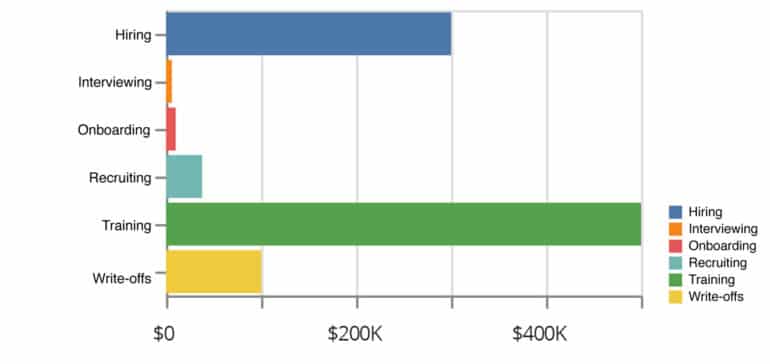The only way younger associate attorneys will make money for your firm is if they feel you are invested in their success.

Table of contents
As 2024 begins, the war for legal talent continues to rage on. It seems every firm in America, regardless of size or specialty, is looking for the same candidate. Associates with between two to eight years of experience are still a red-hot commodity, and firms are struggling to find them, hire them and keep them.
Over the past two years, every senior attorney I’ve spoken with has shared various frustrations with the recruitment, development and retention of promising young talent. They lament the difficulty of finding and holding onto associates — even more distressing is their perception that much of the talent pool is ill-prepared to jump into their job with both feet.
The common perception of many partners is that their younger counterparts don’t share their work ethic, lack interpersonal communication skills, are missing “common sense,” or are void of curiosity. Even though many of these concerns stem from misunderstanding, perception is reality: Many senior lawyers just don’t have confidence in their associates.
The truth is that most young lawyers want to work hard, usually have common sense, are often curious and can communicate fairly well. These attributes are easily obscured, however, by the fact that newer attorneys are not working in environments where they feel supported, recognized, led, or met “where they are.”
Don’t Count on Old Ways of Training New Lawyers
Millennials and Generation Z lawyers want to work, but to provide value they must be given explicit direction, goals and expectations. If a clear path is not provided for them, many will freeze in their tracks. The figure-it-out-dive-into-a-file-and-hope-for-the-best approach to training does not work, as evidenced by high turnover rates, low billing, and a general disinterest in the partnership track.
The old ways just don’t work anymore. For firms that want to secure their future success, improve profitability, mitigate risk and consistently deliver client excellence, it is time to bury the hubris and embrace new ideas.
For firms that still aren’t convinced they need to take a fresh approach to recruiting, training and retaining associates, let’s look at some numbers.
What It Costs to Recruit, Hire and Train a New Lawyer
Depending on firm location and size, the first-year investment in a new associate can be roughly anywhere between $480,000 to $950,000-plus. Here’s the breakdown.
- Recruiting: $2,000-$38,000 (ads and recruiter fees)
- Interviewing: $6,000 (conservative estimate of HR and partners’ time)
- Hiring: $125,000-$300,000 (salary + benefits + taxes)
- Onboarding: $8,000-$10,000 (staff and partner time)
- Training: $240,000-$500,000 (80 hours per month of partners’ time over 6 months)
- Write-offs: $100,000 (average of 25% of billed time for the first year = 1,600 hours at $250/hour)
Cost to Recruit, Hire and Train a New Lawyer: Quick View

This is real money, yet firms often do not take the time to quantify what it costs them to bring on new associates. And this is only first-year costs, assuming they dig in and stay with the firm.
But What Does It Cost When Associates Leave?
It is difficult to quantify the financial loss of losing an associate outside of the initial investment. But there are additional costs that are hard to ignore, such as:
- The “toxic trickle-down” effect, when the departing lawyer spreads ill will and bad mojo around the firm before exiting.
- Copycat quitting.
- Reputation threat within the community and with clients.
- Low morale among remaining lawyers and staff.
- Low engagement.
- A threat to succession planning.
- Having to replace the associate and start over again.
What’s the Answer? Training Associate Lawyers
If you consider the recent surveys, legal press articles, social media feeds or direct feedback from associates themselves, the only way younger attorneys will make money for your firm is if they feel it is invested in their success. This goes far beyond compensation. A successful associate is bought into the firm’s vision, feels safe in their environment to learn and ask questions — and, yes, make some mistakes. They are given explicit directions and measurable goals, and trained to act like a lawyer.
But doesn’t law school train grads how to act like lawyers?
Ask any attorney, anywhere in the world, if their law school education prepared them to be successful lawyers, and the resounding answer is no.
Here’s How to Ensure Your ROI in Young Lawyers
If your firm:
- Expects its lawyers to be strong critical thinkers, then teach them to connect dots.
- Values attention to detail, show associates what this looks like in practice.
- Wants efficiency from its lawyers, teach time management, project management and delegation.
- Wants to fill the leadership queue, provide leadership development training along with an education in the business of law firms.
- Expects all attorneys, including the greener ones, to exude confidence and poise, ensure that they develop executive presence and gravitas.
- Wants to limit malpractice liability, teach a system of recordkeeping and accountability.
- Wants to minimize write-offs, train them in the necessary technical timekeeping and billing skills (and not by partners who aren’t trainers and who do not get paid for teaching younger colleagues).
- Banks on associates to be profitable, teach them how the firm makes money and their respective role in its overall profitability.
Turning newer associates into valuable members of a firm requires thoughtfulness, strategy, accountability, and robust investment in comprehensive and well-rounded professional development and lawyer training.
Image © iStockPhoto.com.

Don’t miss out on our daily practice management tips. Subscribe to Attorney at Work’s free newsletter here >





















